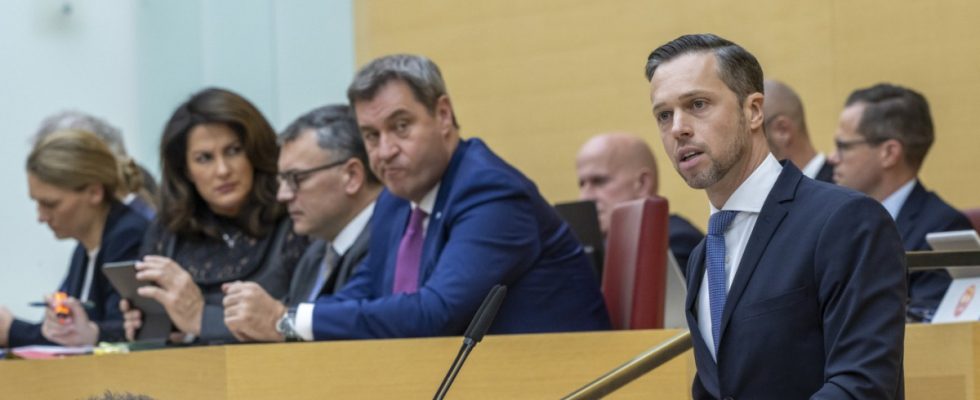The state parliament’s specialist committees rarely shine in the public eye. Attention is focused on the debates in the plenary hall, the stage for policy discussions. The committees do not have two dozen members who meet in smaller rooms. And yet a large part of parliamentary work takes place there. The specialist committees discuss motions and draft laws, which the plenary then discusses in a public manner. The spotlight is rarely directed at the committees as brightly as it was this Wednesday.
In the early afternoon, a sensitive question will be discussed in the state parliament: Should the government factions change the democratic rules of the game in their favor, even if they intend to protect democracy?
The government factions think: yes. By motion, the CSU and Free Voters are pushing through a change to the state parliament’s rules of procedure for the distribution of committees – to the detriment of the AfD, but also the SPD and the Greens. Until now, the procedure according to Sainte-Laguë/Schepers applied, according to which the CSU, as the largest faction, was initially only allowed to choose a committee chair, before it was the turn of the FW and then the AfD, now the third largest faction and largest of the opposition. The so-called D’Hondt method now replaces this method. The consequence: The CSU is initially allowed to vote twice. And because the CSU and FW can reach for the three particularly sensitive committees for the budget, constitution and internal security, these positions are closed to the AfD. There will be no change in the number of committee chairs for the individual political groups.
AfD parliamentary director Christoph Maier accuses the government factions of allegedly disregarding the will of the voters – with the aim of slowing down his party. Maier uses the stage to slip into the AfD’s favorite role: the role of victim. He announces a lawsuit against the new rules of procedure and calls the amendment “a small enabling law for the government factions.” A calculated scandal, again. “Anyone who makes these comparisons shows what intellectual tradition they stand in,” says SPD parliamentary group leader Florian von Brunn. “Some expressions simply shouldn’t be used in parliament,” says State Parliament President Ilse Aigner (CSU).
In any case, the Maximilianeum has seen more cultivated parliamentary debates. In his first speech as CSU parliamentary secretary, Michael Hofmann attacks the Greens with maximum force, who had already announced before the debate that they would reject the government proposal, as did the AfD. As a result, says Hofmann, the Greens have “lost the moral right to speak of a firewall in any way.”
The Greens themselves had made a suggestion as to how an AfD committee chairman could be prevented: by having the committee members not raise their hands for the AfD candidate when they elect their chairmen next week. This Wednesday, the parliamentary groups’ first priority is to secure the right to even propose a chairman.
A committee chairman leads and moderates the meetings, is supposed to explore compromises and formally sets the agenda. But he cannot decide against the majority of the members. And yet: Because the State Office for the Protection of the Constitution observes the Bavarian AfD as a party as a whole, many members of the state parliament consider an AfD committee chairmanship to be problematic. Especially in the Interior Committee, which, among other things, deals with the dangers of right-wing extremism. Or in the Constitutional Committee, where the chairman and his deputy first find out if a member of parliament’s immunity is to be lifted so that they can be investigated.
There was such a case just recently. The Würzburg public prosecutor’s office is investigating AfD MP Daniel Halemba for incitement to hatred and the use of symbols of anti-constitutional organizations. “Imagine” someone like that becoming chairman of the Constitutional Committee, says Simone Strohmayr, parliamentary director of the SPD state parliamentary group, which majority approves of the proposal from the CSU and FW. “With a heavy heart,” says Strohmayr, because it was to the detriment of the SPD. But in this case, “the protection of the Constitution comes first.”
It is interesting that the AfD hardly appears in the speeches of the CSU and FW, at least not literally. They don’t want to make it that easy for the AfD to portray themselves as victims. Instead, CSU man Hofmann says that access rights to the committees must reflect “the will of the majority of the population.” He describes the new procedure as a contribution “to strengthening democracy.” FW managing director Felix Locke also argues in this sense.
The role of the AfD in the committees was already a problem in the last legislative period. The then AfD MP Markus Bayerbach was elected chairman of the education committee – but at the end of 2021 there were revelations that elected officials and members of the AfD were exchanging ideas about revolution fantasies in chat groups. Contrary to what Bayerbach had originally claimed, his name was also listed among the chat participants. The members of the education committee accused him of lying, Bayerbach lost his chairmanship and the then vice-chairman Tobias Gotthardt (FW) took over. The AfD’s attempt to later make one of its MPs chairman again failed due to resistance from the other factions.
And this time? After the plenary session, the parliamentary groups can choose their desired committees – according to the new access model. As expected, the CSU secures – among other things – the chairmanship of the budget and constitution committees. The FW elects, among other things, the Interior Committee. The AfD? Gets the Agriculture and Europe Committees. In the latter function, a chairman can use his role for publicity – during trips or receptions for foreign delegations. It is questionable that the majority of committee members will vote for the AfD candidate.

